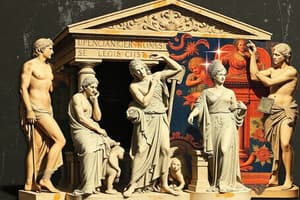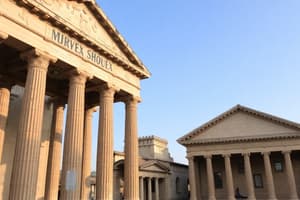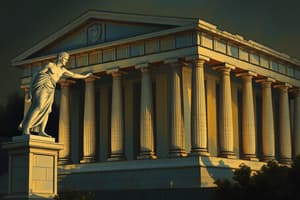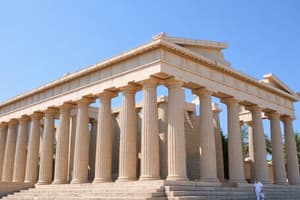Podcast
Questions and Answers
Welke van de volgende kenmerken zijn typisch voor Griekse beelden?
Welke van de volgende kenmerken zijn typisch voor Griekse beelden?
- Ze zijn voornamelijk gemaakt van hout.
- Ze zijn vaak abstract en symbolisch.
- Ze zijn zeer levensecht en gedetailleerd. (correct)
- Ze representeren vaak alleen mythologische wezens.
Wat was een belangrijke reden voor de verspreiding van de Griekse cultuur?
Wat was een belangrijke reden voor de verspreiding van de Griekse cultuur?
- De ontwikkeling van nieuwe kunstvormen in Griekenland.
- De invloed van de Romeinen op de Griekse samenleving.
- De ontdekking van nieuwe aardse rijkdommen.
- De groei van de bevolking leidde tot voedseltekorten. (correct)
Hoe komt het dat Griekse cultuur belangrijker wordt geacht dan die van de Perzen of Egyptenaren?
Hoe komt het dat Griekse cultuur belangrijker wordt geacht dan die van de Perzen of Egyptenaren?
- De Grieken waren de enige cultuur die schrift gebruikten.
- Veel kennis van andere culturen is verloren gegaan doordat de Griekse cultuur de overhand kreeg. (correct)
- De militaire strategieën van de Grieken waren superieur aan die van andere culturen.
- Griekse kunst werd geperfectioneerd door invloeden uit Afrika.
Welke bouwstijl beïnvloedde de Grieken bij het ontwerpen van hun tempels?
Welke bouwstijl beïnvloedde de Grieken bij het ontwerpen van hun tempels?
Wat was de houding van de Grieken tegenover andere culturen?
Wat was de houding van de Grieken tegenover andere culturen?
Welke periode markeerde de eerste golf van verspreiding van Griekse cultuur?
Welke periode markeerde de eerste golf van verspreiding van Griekse cultuur?
Welk kenmerk van Griekse sculpturen was bijzonder opvallend voor de sculptors?
Welk kenmerk van Griekse sculpturen was bijzonder opvallend voor de sculptors?
Welk effect had de verovering van Alexanders de Grote op de verspreiding van de Griekse cultuur?
Welk effect had de verovering van Alexanders de Grote op de verspreiding van de Griekse cultuur?
Flashcards
Griekse kunst en architectuur
Griekse kunst en architectuur
De Griekse kunstenaars en architecten maakten belangrijke veranderingen. Hun beeldhouwwerken waren realistisch en perfect proportioneel.
Griekse invloeden
Griekse invloeden
De Grieken namen inspiratie uit hun omgeving, zoals Egypte, voor hun eigen kunst en architectuur.
Verspreiding van Griekse cultuur
Verspreiding van Griekse cultuur
Griekse cultuur verspreidde zich in twee golven: een in de 8e en 7e eeuw voor Christus, en een na de veroveringen van Alexander de Grote.
Eerste golf van Griekse expansie
Eerste golf van Griekse expansie
Signup and view all the flashcards
Tweede golf van Griekse expansie
Tweede golf van Griekse expansie
Signup and view all the flashcards
Griekse superioriteit
Griekse superioriteit
Signup and view all the flashcards
Invloed van Griekse cultuur
Invloed van Griekse cultuur
Signup and view all the flashcards
Unieke Griekse innovaties
Unieke Griekse innovaties
Signup and view all the flashcards
Study Notes
Greek Culture
- Greek art and architecture are renowned for their innovative designs.
- Greek sculptures are highly realistic, portraying gods with meticulous detail.
- Sculptors studied the human form in great detail, focusing on muscles, facial features, and overall appearance.
- Greek artistic inspiration derived from neighboring cultures, including Egypt.
Spread of Greek Culture
- Initially, Greek culture was confined to a relatively small geographic area (modern Greece and western Turkey).
- Over centuries, Greek culture expanded extensively across the ancient world.
- This expansion occurred in two phases:
- The first wave, occurring between the eighth and seventh centuries BC, was driven by population growth and food shortages, leading to emigration.
- The second wave followed Alexander the Great's conquests (330 BC), which encompassed significant portions of Asia and Egypt.
- Alexander the Great sometimes allowed existing local customs, like those of the pharaohs in Egypt, to continue, but Greek cultural dominance was asserted.
- Greeks viewed their culture as superior, considering non-Greek cultures, languages, and customs to be barbaric.
Influence of Greek Culture
- Greek culture is considered influential due to a combination of factors, exceeding that of Persian or Egyptian cultures.
- Greek civilization introduced groundbreaking concepts and ideas rarely seen in other ancient cultures.
- The preservation of Greek knowledge is superior to that of some other ancient civilizations (Egyptian, Persian). Greek culture absorbed and adapted elements from these cultures, leading to a significant portion of their knowledge being lost to time or deciphered centuries later.
- Extensive Greek knowledge preservation, particularly in Egypt and after Alexander the Great's expansion, ensured the retention of crucial information about ancient civilizations.
- Greek culture was greatly admired in Europe, largely propelled by the Romans, who held a high regard for Greek culture.
- The term "classical culture" often encompasses both Greek and Roman culture, highlighting the fusion of their influences.
- Arab scholars contributed to the preservation and dissemination of Greek knowledge.
Studying That Suits You
Use AI to generate personalized quizzes and flashcards to suit your learning preferences.
Description
Deze quiz behandelt de rijke geschiedenis van de Griekse cultuur, inclusief kunst en architectuur. Ontdek hoe Griekse kunstenaars de menselijke vorm bestudeerden en hoe de cultuur zich verspreidde door de tijd en over continenten. Test je kennis over de invloed van Alexander de Grote op de verspreiding van Griekse gewoonten en tradities.




